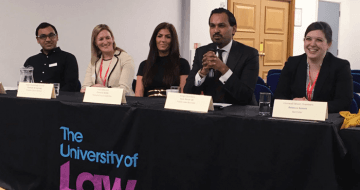Ahead of next Tuesday’s event, ‘How to get into law as a career changer’, ULaw’s John Watkins talks transferrable skills and reveals how career changers can show risk-averse employers that they’re a safe option

These days there’s more scope for career changers because we’re living and working longer and better, The University of Law’s (ULaw) director of employability, John Watkins believes — but it can often be lack of confidence that holds career switchers back.
Those thinking of transferring into law from different career paths remain unsure if it’s the “right move and whether it’s been done before”. Adding to these concerns is the very real fierce competition for a finite number of training contracts that pits career changers up against university graduates. It remains the case that while the legal profession as a whole has been receptive to career changers — especially at the bar — Watkins finds that there’s a misconception that career changers are difficult to manage and will be difficult to integrate into the firm. No wonder career changers often lack confidence about making the move.
But Watkins believes this can be overcome, first by recognising what you have to offer: “I often meet career changers at open days that are not aware of their own skills. By spending some time thinking this through they will be better equipped to convince their prospective employer that they are the right candidate for the job.”
To build up your confidence, Watkins recommends first thinking about the competition, and what gives you an advantage over first job-ers. For instance, they are likely to have little, if any, exposure to the workplace. Whereas, for career changers that have worked for a long time, they’ll have a roster of practical and technical skills that are potentially transferrable into a legal setting. Further, they may be more proficient in business and IT tools — such as financial accounts and Excel spreadsheets — that makes them a real asset to legal employers.
Career changers can also benefit by showing an employer that they are receptive to taking orders and that they can work with — and for — younger people. Don’t wait around to be asked. “You need to be proactive and make sure there are no question marks next to your name that will count against you,” Watkins advises.
Ultimately career changers should also be aware that: “No employer can ask directly about age as that would be discriminatory,” Watkins says.
Watkins knows the power of transferrable skills having been a successful career changer himself. After graduating from the University of Exeter with a degree in social policy and administration, his career first began in broadcasting. Having spent a “disproportionate” amount of his studies in Exeter’s University radio station, Watkins swiftly found himself as the BBC’s sports correspondent for Watford Football Club. Although he initially enjoyed being paid to watch and report on football, this novelty soon wore thin: “I fancied it as a future career but it eventually turned into a real chore.”
Instead, Watkins made his first bold career move into accountancy — a “safe option” that appealed to him as, he believed, there would always be a demand for those with financial skills. Still, it wasn’t long before Watkins soon moved away from typical number-crunching tasks and, as director of learning and development for accountancy firm, PKF, moved towards training up new employees — putting to use the communication skills he picked up from broadcasting.
Unfortunately, there was trouble ahead for Watkins’ future-proof career path. In 2012, in the aftermath of the financial crisis that rocked global markets four years earlier, the accountant was made redundant after 15 years in the industry.
Next came Watkins’ second bold move, this time into higher education, to join the University of Surrey’s careers team. Though he describes the switch as more “luck rather than judgement”, he also successfully demonstrated the usefulness of transferrable skills. His experience in accountancy, getting a return on clients’ financial investment, was also applicable to interacting with students who now expected a high return as a result of escalating tuition fees. His time as learning and development manager also put Watkins in good stead to support students’ transition into the workplace.
In summary, what Watkins did and what he suggests all career changers consider is this: “You have to turn the question around. Rather than say, ‘Can I have a job, please?’, you should say instead, ‘If you give me a job, this is what I can bring to the party’.”
John Watkins will be speaking alongside lawyers from Irwin Mitchell, Mayer Brown, Shearman & Sterling and 2 Temple Gardens at next Tuesday’s event, ‘How to get into law as a career changer’, at The University of Law in Moorgate. You can apply for one of the final few places to attend the event, which is free, now.



